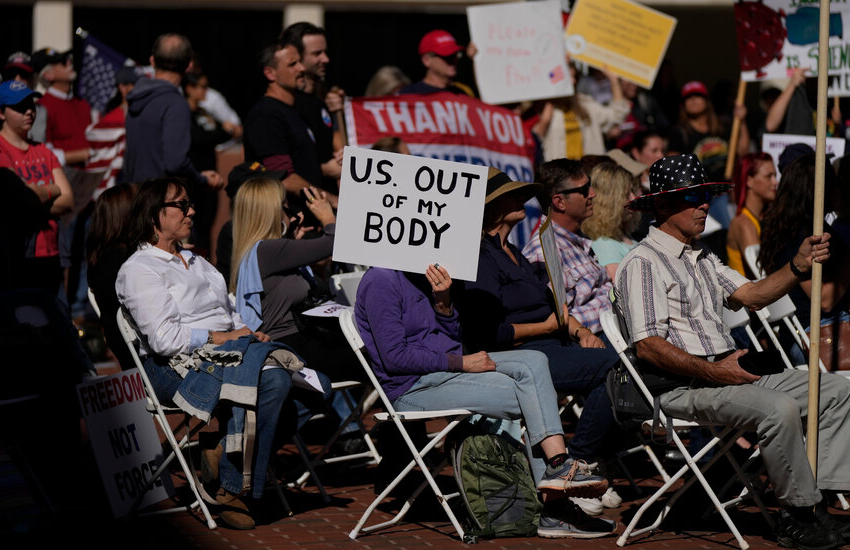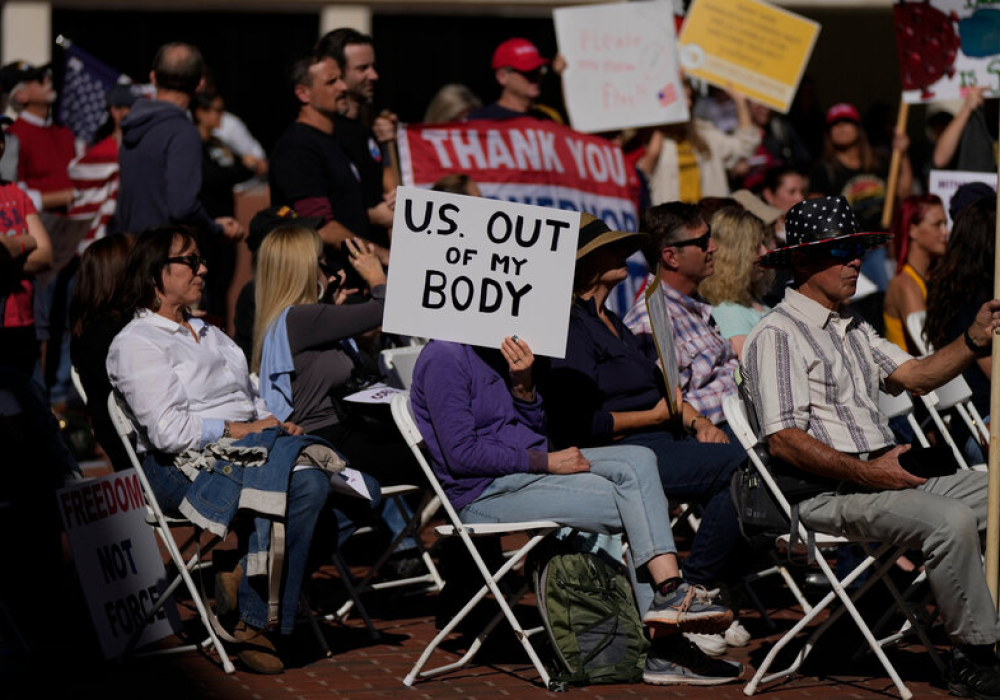TALLAHASSEE, Fla. — Early this year, Gov. Ron DeSantis crisscrossed Florida promoting coronavirus vaccines, visiting retiree communities and hospitals, and celebrating people who got their shots.
But it was a remarkably different picture this week, when Florida’s lieutenant governor, Jeanette Nuñez, was a prominent speaker at a rally organized by anti-vaccination activists on the State Capitol steps.
The jarring scene gave vaccine skeptics in Florida a big win and moved the state further away from the guidance of federal public health officials, reflecting how a highly politicized pandemic has only become more so as Republican-controlled states confront the Biden administration’s wide-ranging attempts to ease it.
Perhaps no state has been more aggressive than Florida, where Mr. DeSantis and his allies are betting that the anger over public health restrictions that drove Republicans to the polls this month in Virginia, New Jersey and other states will grow their political base and keep voters fervently engaged going into the 2022 midterms. Mr. DeSantis, who faces re-election next year, is also considered a leading 2024 Republican presidential contender.
The evolving strategy has turned traditional politics in Florida upside down, creating a tension between Republican state lawmakers and big business, one of their key constituencies, while leaving the small minority of Democratic legislators to defend local government efforts to control the virus.
Almost entirely along party lines, Republicans passed four bills on Wednesday to curtail mask and vaccine mandates, the culmination of a three-day special legislative session that Mr. DeSantis called so swiftly it caught even Republican leaders by surprise. The session was urgently needed to combat federal government overreach, Mr. DeSantis argued.
“No Floridian should be losing their job over Covid shots,” Mr. DeSantis, who has taken to dismissing the vaccinations as “jabs” or “injections,” said on Tuesday. “That’s a personal decision that people should be able to make.”
The move against vaccination requirements has empowered groups whose fringe views on the vaccines were met with little pushback from Republican legislators, a striking departure from past Florida politics.
“The conscience of their caucus has been hijacked by extremes,” said Representative Ramon Alexander, a Tallahassee Democrat. “It’s a danger to democracy.”
Mr. DeSantis and Republican lawmakers insisted that they support Covid-19 vaccines — and in many cases noted that they have taken them.
“No one is arguing that the vaccine doesn’t work,” Senator Danny Burgess, a Zephyrhills Republican, said on the Senate floor. “Thank God that we have a vaccine.”
House Speaker Chris Sprowls, a Palm Harbor Republican, said the new legislation was aimed at allowing Floridians to decide for themselves.
“We’re getting to this place where nuance is lost on everyone,” he said. “You can be for a vaccine or for the opportunity for people to get a vaccine and still not support a massive government-forced vaccination.”
Similar paradigm shifts have been occurring in other Republican-controlled states, including Texas, where business leaders in the past most often saw their interests reflected in the actions of lawmakers. Now, those same lawmakers are instead channeling the wishes of activists who oppose Covid vaccinations altogether under the guise of promoting freedom.
In addition to Florida, at least five other states have considered or held special sessions on pandemic mandates, according to the National Conference of State Legislatures.
About 60,800 people have died of Covid-19 in Florida. The state was hit hard by the virus this summer, when the Delta variant filled hospitals in much of the state with more patients than at any time during the pandemic. That wave has burned itself out, and in recent days new cases and hospitalizations have fallen to some of the lowest levels in the country. About 61 percent of Florida’s population is fully vaccinated, slightly higher than the national average, according to federal data.
Nov. 18, 2021, 9:36 a.m. ET
Critics of the governor have said that his fight against mandates resulted in needless deaths. Florida experienced its worst daily death tolls during this year’s summer surge, when vaccines were already widely available.
As cases spiked, Mr. DeSantis fought local school districts and governments that required masks or vaccines, withholding funds, fining them or taking them to court. (Most school districts have now loosened their mask restrictions, in light of the falling virus levels.)
The DeSantis administration ended its declared coronavirus emergency in June. It shut down state-run mass vaccination and testing sites. Unlike when the vaccines first came out, the governor has not made a big push for people to get boosters or their children vaccinated.
Instead, Mr. DeSantis has encouraged police officers to move to Florida if they left out-of-state law enforcement agencies because they did not want to get vaccinated. In August, he said whether someone gets vaccinated “really doesn’t impact me or anyone else” — though society collectively benefits when more people get vaccinated.
The governor the following month stood on a podium in Gainesville next to a city employee who falsely claimed that a coronavirus vaccine “changes your RNA,” and did not challenge his assertion. “I don’t even remember him saying that, so it’s not anything I’ve said,” Mr. DeSantis said the next day.
The governor’s dalliance with vaccine doubters may have begun in April, when Mr. DeSantis declined to get his Johnson & Johnson shot in public, joking that he did not need to show off his biceps. (He has since declined to say if he has received a recommended booster or intends to get one.)
In September, Mr. DeSantis picked as Florida’s new surgeon general Dr. Joseph A. Ladapo, an outspoken mask and vaccine skeptic who has not disclosed whether he has been vaccinated. The Florida Department of Health, under his guidance, would have significant authority over how the state enforces anti-mandate legislation.
Last month, Dr. Ladapo declined to wear a mask when he went to meet with Senator Tina Polsky, a Boca Raton Democrat, even after she said she had a serious health condition and asked him to. She later publicly disclosed that she had recently undergone surgery for breast cancer.
On Wednesday, Ms. Polsky drew a line from the governor’s selection of Dr. Ladapo to Republican lawmakers’ tolerance of the anti-vaccination activists who filled legislative committee meetings this week.
“You can all say that you’re pro-vaccine and anti-mandate, but these actions are playing to this crowd,” she said on the Senate floor.
Many lawmakers worried that businesses wanted to retain the ability to impose mandates; many of the state’s biggest employers, including Disney, already have them. And business owners, they said, did not want to face conflicting state and federal laws.
The Biden administration has ordered federal employees and contractors to be vaccinated, as well as employees of health care companies that receive Medicare and Medicaid. Several states with conservative governors, including Florida, have already challenged those federal mandates in court.
In the end, lawmakers did not go as far as the governor had hoped.
They banned vaccine mandates for public school districts and local governments and gave parents sole discretion over whether students should get vaccinated or wear masks. (The DeSantis administration fined Leon County $3.5 million last month for mandating vaccines for its employees — $5,000 for each person.)
They allowed vaccine mandates for private businesses as long as companies included exemptions for medical and religious reasons that were expected to be much broader than the federal exemptions. Employees could also opt out if they were willing to be periodically tested or wear protective equipment, like masks. Employers would have to pay for the tests or provide the masks.
The Legislature also imposed fines of $50,000 per violation for employers with 100 workers or more (and fines of $10,000 for smaller employers) that mandate vaccines outside the allowable guidelines.
Lawmakers also allocated $1 million to the governor’s office to study leaving the Occupational Safety and Health Administration, a clear jab at the Biden administration’s workplace order.
Democrats overwhelmingly opposed the new legislation.
“Does this bill really truly attempt to keep Floridians safe?” said Representative Angie Nixon, a Jacksonville Democrat, who contracted Covid while she was pregnant last year. “Or was it crafted to kick off a presidential campaign for our governor?”










